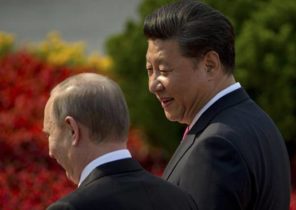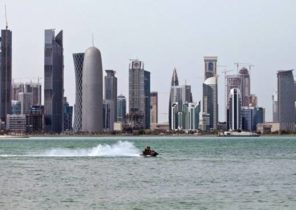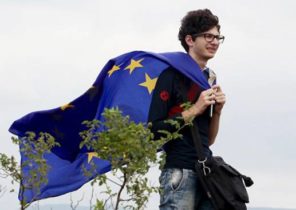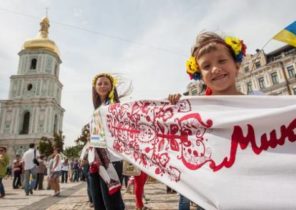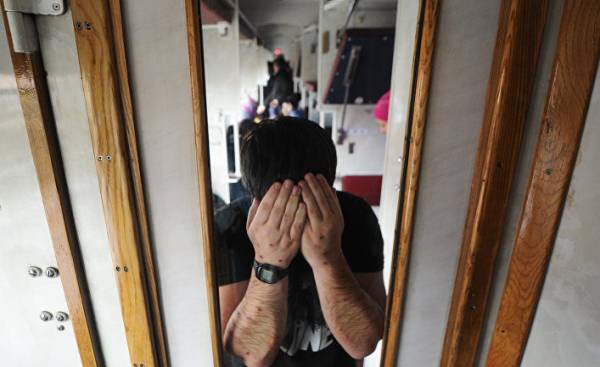
Mauran nervously glancing at the scoreboard at the railway station in Brest. 7 hours 9 minutes by local train is departing from this Belarusian city across the border in Terespol in Poland. Have Maurana only a few minutes. 26-year-old man from Urus-Martan, Chechnya, with 50 thousand inhabitants, begging their compatriots at the station the money for the trip. Because Maurana ran out of money. Over the past two months it 15 times boarded the train to Terespol and each time he was sent back to Belarus. Like hundreds of his countrymen, Mauran firmly stuck in the Belarusian border town of Brest. In fact, he was going to be in Germany. To Poland to go just 17 minutes, a simple ticket is worth in terms of four euros. EU so close. And yet for many out of reach. Because Poland is serious about border security and is sending the majority of migrants from Belarus, among which almost all Chechens back in the day attempt to enter ago in Belarus. Therefore, the town of Brest, with its 300 thousands inhabitants, where the Wehrmacht and Red Army waged fierce battles, and every day becomes the final stop for hundreds of people from the Russian Republic in the Caucasus. According the European Union Agency for security of external borders Frontex, on any of the European external border in 2016, did not send back as many migrants as here in the East.
Brest is a hot spot of a forgotten migration route to Europe. The number of illegal entries, there has never been as high as, for example, on the Balkan route. Also thousands of human tragedies that played out now in the Mediterranean, show that the situation in the East of the continent are less problematic. And yet: this situation on the European Eastern border in Poland ticklish. And the echoes of her coming to Germany.
When the poles introduced their strict border control, people in Brest directly felt it. Hundreds of Chechens suddenly began to live under the open sky near the station. Some sought help in churches in the city. Almost three quarters of the year 58-year-old priest Igar Kanarazu in his Roman Catholic Church gives shelter primarily to Chechen migrants. Many, like Marana, ran out of money: the Muslims needed a bed. Religion began to play a secondary role. For both sides.
“It was my duty as a Christian to help these people,” says Kandrac. Tonight he came into the Church alone. Left the family of seven people made him goodbye galinis, the Chechen national dish of greasy soup of meat and potato “sticks” that need to dip in garlic sauce. This family he was able through a friend to find a house in the countryside and to provide them with jobs on the farm — after they’ve tried 60 times to enter Poland. The priest says, “Now they want to arrange his life in Belarus.”
Around the middle of 2016 ended the dream of a quick path to the West through Belarus. The poles have imposed strict border control. The vast majority of Chechens since then has no right to Terespol even to apply for asylum. On this evidence the sample survey of the Commission of the European Council on human rights: according to this, on August 11 last year, 416 of the Chechens wanted to travel by train from Brest to Poland.
However, Polish border guards took on this day, only seven applications for asylum. Many lawyers have called the practice a scandal and violation of the Geneva Convention on human rights. Others, conversely, find that Poland is only doing his job and guarding the external border of the EU. Different than Italy or Greece.
The hard policy of the poles can be attributed to the constant growth of the number of Chechen refugees. That more and more people are fleeing from the Caucasian Republic, there are several reasons. Presumably look very attractive German culture of hospitality in the summer of 2015. In addition, the situation with human rights in Chechnya have once again deteriorated. Clique appointed by Moscow ruler Kadyrov willful arrest of citizens, tortures and kills them.
“You are crazy, if we let them into the country”
No one in the Brest does not know how many Chechens are currently located in this city. We are talking about one hundred families, which corresponds to approximately 700 people. At peak times last summer, sometimes for several thousand people. The vibrations are great. Not everyone in town is so open towards migrants as a priest Kanarazu.
Igar Baranowski, the priest’s friend and publisher of the local Church Newspapers, shares the hard-line of Poland. “The truth is that it is good that the border is closed. The Chechens are not suitable for Europe. When they leave the house, do not turn off the water and light. Do you know how often the priest tried to teach them that?” The Chechens expected that they will understand, however, stubbornly resisted the fact, in order to adapt, says Baranowski. And the city is also a sense of rejection. “The Chechens even the children are armed”, — says one woman. “You Germans will be just crazy, if you let all these people in your country”.
But for those who manage to get in Terespol road in Germany almost open. Accurate representation of where Chechens go on, no one else. Ultimately, Germany and Poland belong to the Schengen area without border controls. It is known, however, that very few Chechens staying in Poland. This is confirmed by data of the Ministry of foreign Affairs in Warsaw. According to this, last year 8500 Chechens have applied for asylum in Poland. Only 55 applications were accepted. 7200 transfers statement left the country before the decision was made. Most of them wanted to go to Germany, it is believed the security services. In Germany, the Chechens are considered problematic group among applying for asylum. Many close relations with the Salafists. In Brandenburg, where the first gets most of them, half out of a hundred persons, representing a potential danger, are Chechens. Similar trends are also found in other German regions, where many Chechens, for example, in North Rhine-Westphalia. In many places, the authorities complain about difficulties.
Of the nine thousand Russians, wishing to obtain the right to asylum in Germany, last year, exactly 80% were Chechens. Only part of their statements was admitted. This year we took while 8% of the number of applications. In fact, many had again to leave the country. However it is quite difficult to implement.
For example, there are migrants who prior to the filing of statements of performance of the right to asylum in Germany has already been registered in Poland. According to the Dublin agreement on refugees, in fact, Poland would have to take care of this group of migrants. Therefore, more and more Chechens transferred to this neighbouring country. However, the authorities came to the conclusion that in most cases only a few days or weeks these migrants reappear in Germany. Therefore, Brandenburg demanded from the Ministry of internal Affairs of Germany to apply the so-called right to act on their own behalf. Then Germany would, despite the registration of refugees in Poland, return of the Chechens to Russia directly.
However, the Federal government is against. Although some officials are quite convinced that this would be the right way — besides the Russian government in the talks also signaled that he would take people back. But officially, the Ministry of internal Affairs says that the return of migrants to the Russian Federation to carry out “fundamentally hard”. The one who made it to the European Union, there is nothing more to fear.
Know it also and Chechens in Brest. Why they are so persistent. Maran describes several reasons for his escape to the West. “In Chechnya I was a PE teacher until I was suddenly fired”. According to him, in this little Republic, there is complete arbitrariness. Anyone who is ruler Kadyrov and his executioners have not stomach, may be instantly arrested. Maran says, “I want only one thing: a better future for myself and my family.”
He placed his family, his pregnant wife and son in a small apartment in Brest. He hopes that after a successful entry into the EU will be able to move them yourself. Accommodation is in terms of ten euros per day. He claims that his finances with the help of relatives who send him money from home. There is no “Plan” Marana no. The return to Chechnya? Unthinkable.
